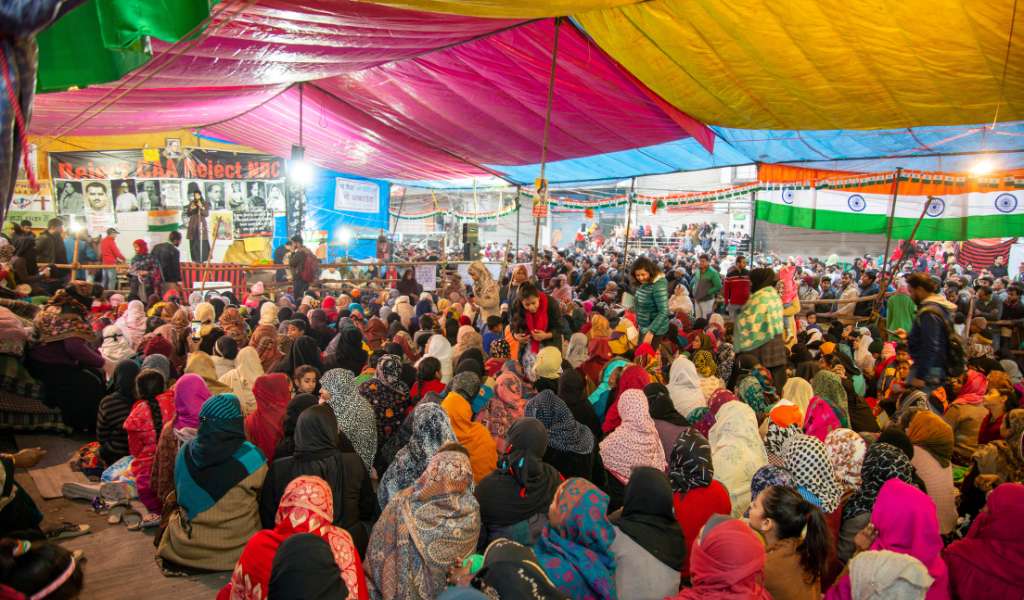India, touted as the world’s largest democracy, has been witnessing an erosion of its democratic fabric. Over the past decade, authoritarian tendencies have intensified, marked by the centralisation of power, the undermining of democratic institutions, and the silencing of dissent.

From curbs on press freedom to the marginalisation of minority voices, the country is grappling with a shift away from its pluralistic ideals. This transformation is not happening in isolation—it reflects broader global trends of rising authoritarianism, but its manifestations in India are deeply rooted in the country’s unique socio-political and historical context. How did the country arrive at this juncture, and what does it mean for its future as a democracy?
To begin answering these questions, IDS hosted the online event ‘India development at a crossroads?’ with Medha Patkar, Anand Teltumbde and Gladson Dungdung. The speakers offered nuanced perspectives on the issue of authoritarian developmentalism, through their lived experiences in India. They illustrated how the state through a narrative of economic growth and efficiency, implemented centralised decision-making and limited participatory democracy.
The nexus between crony capitalism and government machineries was also made apparent through the examples of large-scale infrastructural projects such as ports, mines, highways, bullet trains and large dams. These have often led to skewed and unjust use of local resources and the commons, increasing repression of activists and dispossession of local people from their commons, while serving profit-making agendas.
Extraction of resources
Patkar raised several questions around the extraction of resources and increasing resource conflicts across India – who are the rightful owners of natural resources and who should, therefore, be allowed to harness these? In this context, she spoke of the nexus between Big Business and government, and the mining of resources for profit-generation, at the cost of the erosion of economic rights, human rights, as well as climate change. Therefore, Patkar pointed out, it was important to question this centralised model of development.
Through struggles, legislation like the Forest Rights Act came into being, which has enabled forest-dwellers to have greater control over the conservation and sustainable use of own forests with positive implications for livelihood security as well as communal and individual rights to forest resources. Yet it is not fully implemented and continues to be diluted.
Teltumbde situated this argument by stressing how authoritarian developmentalism has undermined the independence of institutions such as the media, judiciary and electoral commission and also led to the suppression of dissent, unjust incarceration of critics and activists and cracking down of NGOs via amendments to the FCRA (Foreign Contribution Regulation Act).
Socially and economically vulnerable worst affected
Those impacted most by rising authoritarianism, are those who are most socially and economically vulnerable – Dalits, Adivasi communities, Muslims and women. Dungdung explained this point through an example from his home state of Jharkhand, where the Bhartiya Janta Party (BJP) government in 2016, enlisted 850,000 hectares of land, including sacred groves, forest lands into a land bank. They did this without informing the local Gram Sabhas (a village-level democratic, governance body), leading to the dispossession of local resource users, especially Indigenous communities who not only depended on forests for their livelihoods but also place cultural significance on the lands.
This curtailing of resources through arbitrary and top-down developmental regulations is magnified by the ‘othering’ of marginalised identities. Adivasi communities who are merely seeking to protect their lands and livelihoods are now being labelled anti-development.
Many activists see the future as bleak given so many clampdowns and unjust incarcerations. Speakers at the IDS online event also commented that they thought the youth are also not embracing activism as in the past. These issues notwithstanding, there remains a sustained effort to counter authoritarian regimes, particularly through grassroots movements. Beyond electoral politics, in every corner of India various movements and struggles have been resisting the backsliding of democratic values, through multi-pronged approaches.
Activism and resistance
The feminist movement, for instance, offers examples of Muslim women resisting authoritarian control through active political engagement. Social media has also emerged as a powerful tool for countering authoritarian narratives, facilitating information-sharing, and fostering political consciousness. This digital activism has, in turn, encouraged more creative and accessible forms of resistance, empowering ordinary people to understand their legal and constitutional rights and to fight for them through multiple means.
It is also important for different micro struggles around the country to find common ground and build alliances to address the problem at wider scale. Elites also need to change their lifestyle and be more sensitive to their role in creating and sustaining inequalities and environmental harms. Struggles against deeply rooted social norms and practices, such as caste-based discriminations, will only be effective when they include action from oppressor castes.
Academics and activists
The role of academia is essential in exploring and offering deeper answers to the complex dynamics of rising authoritarianism. For one, academics can keep the documentation and analyses of authoritarian regimes grounded in local experiences and linking local activism to academic knowledge-production can help amplify grassroots voices and ensure that research remains relevant and actionable.
To counter the broader trends of authoritarianism both academics and activists can draw inspiration from local struggles to generate nuanced understandings of how authoritarianism is experienced and resisted from below. This will help inform strategies for resistance that are rooted in the realities of those most affected.
